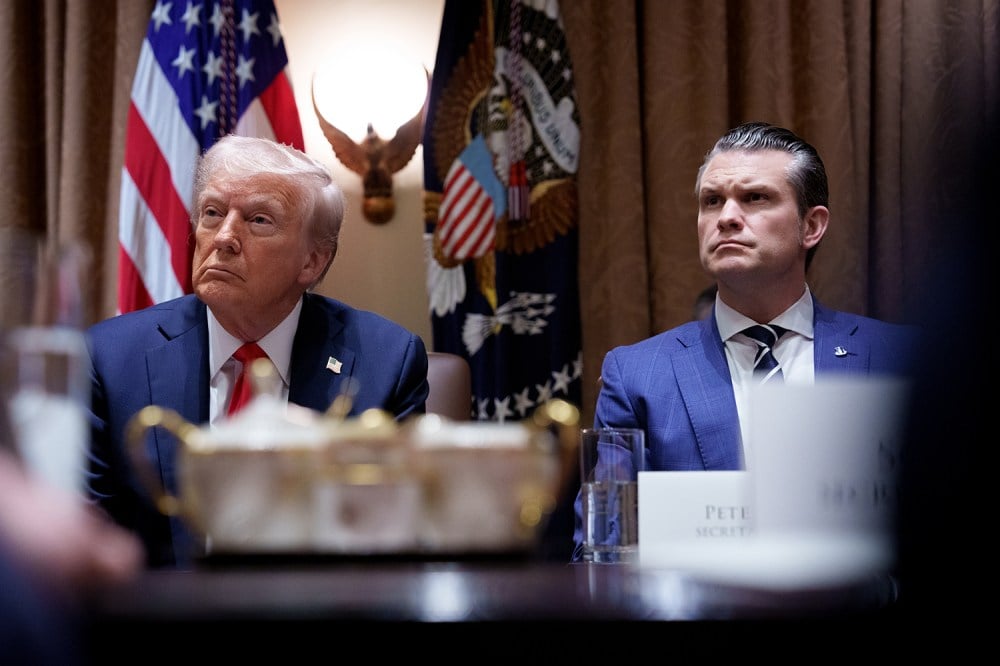In the days before the surprise U.S. attack on Iran, Politico reported that one man in the Defense Department was having an outsized say on Washington’s Iran strategy: Erik Kurilla, the hawkish U.S. Central Command leader known as “The Gorilla.” “He’s a big dude, he’s jacked, he’s exactly this ‘lethality’ look they’re going for,” said an anonymous former official. So long as military advisors “come across as tough and warfighters,” the source added, Defense Secretary Pete Hegseth “is easily persuaded to their point of view.”
Kurilla’s influence illustrates a broader truth about Washington’s current priorities: In President Donald Trump’s second term, hypermasculinity has become the governing logic of U.S. foreign policy. Masculinity in itself—associated with traits such as leadership, strength, and courage—is not harmful. But a brand of traditional masculinity defined by aggression, lack of emotional regulation, and poor impulse control is, and it has become a driving force in an administration that favors preemptive attacks in pursuit of national self-interest over U.S. values.
The U.S.-China tariff war—a symbolic contest grounded in masculine tropes of refusing to back down or betray weakness—exemplifies this dynamic. But its apex so far has been the Trump administration’s approach to the Iran conflict. As Trump’s decision to strike Iran’s nuclear program makes clear, hypermasculinity now directly shapes U.S. tactical moves, overriding considerations of diplomatic fallout or escalation risks.
World leaders have begun policing each other’s legitimacy based on how convincingly they perform their role as hard-line protectors of national interests. Consider Trump’s dismissal of Iran’s “very weak” retaliatory attack on Monday, or British politician-turned-academic Rory Stewart noting that “Iran’s legitimacy depends on trying to launch a backlash against the U.S.”
This logic isn’t new. Even more traditional negotiation tactics in U.S. history featured masculine rhetoric. (President John F. Kennedy famously bragged that he “cut [Nikita Khrushchev’s] balls off” during the Cuban missile crisis.) But its ubiquity might be. Today, foreign policy is increasingly turning into a zero-sum contest where leaders are incentivized to perform a brand of masculinity signaling dominance, control, and strength—or risk appearing weak.
In the aftermath of World War II, U.S. President Dwight D. Eisenhower set out a moral architecture for U.S. foreign policy that prioritized diplomacy. Advocating for peace and cautioning against unnecessary entanglements, he opposed striking first and the notion of “preemptive wars.” In his 1961 farewell address, Eisenhower warned against the growing influence of the “military-industrial complex.”
That view is largely at odds with the Trump administration’s embrace of hypermasculinity. Once dominated by social elites, diplomacy tends to rely on a tight script of how to behave and act. As one scholar of early modern England has noted, that code is inherently removed from traditional displays of manliness through “physical prowess.” Historically, diplomacy relied on personal relationships and subtle negotiation, and since notions of masculinity varied from culture to culture, it was difficult to perform masculinity while conducting foreign policy.
Now, this approach—of tact, cooperation, and restraint—has been reframed as emasculating. One Trump administration official, speaking anonymously to NBC News, recently dismissed traditional diplomacy as a “game of telephone.” Diplomacy has also become increasingly public-facing. As Foreign Policy’s Ravi Agrawal has written, Trump has ushered in a reality TV presidency, one that upends the idea that diplomacy was never meant for public consumption.
Like reality TV, representing one’s nation-state has become highly personal. Stewart has argued that Trump’s diplomacy is driven by whatever makes him “look like the tough guy.” His administration is full of men who embody this ethos; just consider Hegseth boasting about the number of pushups he did the morning of his Senate confirmation hearing.
This foreign-policy turn has been partly fueled by the global trend of masculinity becoming increasingly important to political identity. Much has been written about the cultural reckoning around male resentment as men have fallen behind in education, struggled to adapt to the changing workforce, and experienced worsening mental health. Around the world, these disaffected young men are turning to the right.
Online ecosystems, or the so-called manosphere, have normalized gender hierarchies, bolstering narratives that men are victims of modernity, feminism, and softness. Misogynistic content is reaching boys at an unprecedented pace—according to the New York Times, after less than nine minutes of scrolling on TikTok. Societies’ failure to offer guidance on men’s role in society has left young males vulnerable to voices that shift the blame to women, with 60 percent of Gen Z men across 31 countries now believing gender equality has gone too far.
This manufactured outrage around male victimhood—the kind that has underpinned many mass shootings—has elevated emotion over ideology in politics. And the U.S. right seems to be appealing to those emotions. Conservative pundits have wagered that tariffs will fix the country’s so-called masculinity crisis. Meanwhile, in a now-deleted tweet from April, the U.S. Department of Labor shared a romanticized image of a return to manufacturing—artificial intelligence-generated white men in hard hats, with grime-covered faces—a future that even a commentator for the right-wing Cato Institute recognized as “neither preferable nor possible.”
When policymaking becomes rooted in alpha masculinity, leaders become further detached from any lived horrors of war. After the United States bombed Iran, Keith Kellogg, the U.S. special envoy for Ukraine and Russia, posted on X about the “different feel” in the West Wing, which he compared to a “sports team that won a major game or in business winning a major competitive contract”—two traditionally male-coded spaces driven by zero-sum decision-making. “You ‘strut’ differently,” he added, before calling Trump “Bad Ass” (shorthand for masculine legitimacy, militarism, and bravado).
Meanwhile, in the wake of the operation, Trump framed the United States as a winner whose “great American Warriors” will “never, ever fail,” while ignoring any potential human cost of the conflict’s fallout. This dissonance has long existed in foreign policy, where suffering is defensible in the name of statehood, but the Trump administration’s posturing essentially turns international crises into a locker-room spectacle.
Furthermore, Trump’s attitude reduces foreign policy—and governance more broadly—to clear, winnable outcomes. This sidelines the complexity of peacebuilding, denigrating the hard-won consensus that defined 20th-century diplomacy. For peace to be lasting, it needs to be rooted in efforts for dialogue and mutual understanding.
This crisis of manhood isn’t just limited to the United States. Trump is merely a particularly salient expression of a broader shift, as young men around the world look to leaders who will reflect their anger and disaffection back to them: Argentine President Javier Milei, Hungarian Prime Minister Viktor Orban, former Brazilian President Jair Bolsonaro. In contrast, a figure such as former U.S. presidential candidate Kamala Harris is dismissed as someone whom these men would, in Trump’s words, “walk all over.”
The repercussions are serious in this moment of polycrisis. From climate change to AI to migration, cross-border challenges that demand collective solutions are instead being met with competition and isolationism. Around the world, voters increasingly feel that the social contract is fraying—that despite their personal sacrifices, societies’ failure to act leaves the future looking bleak. As trust in governments’ capacity to deliver change erodes, the logic of “payback and vengeance”—against elites, women, immigrants, and the international system—gains ground.
At this critical tipping point for AI regulation and climate action, this masculine logic narrows policy imagination, making states more susceptible to interconnected risk. As a doctrine of dominance, masculinity will indeed create some winners, but at the expense of under-equipping institutions for long-term threats. Its logic allows people to believe that individual leaders can manage crises under the current system—for instance, with silver-bullet techno-fixes. This enables a select few to profit from short-term solutions without overhauling the systems that caused them.
Masculinity in itself is not the problem. When societies allow manhood to encompass a range of identities that break from the traditional script, it can even become a strength. Roles often associated with masculinity—such as the protector or provider—are valuable to society. But rather than being driven into wars of ego, men must root their leadership in care and cooperation.
Naming hypermasculinity as a governing logic is essential to understanding what’s driving today’s foreign policy—and what it may ultimately cost citizens of all countries, not just the United States. Policymakers have a choice: Remain in cycles of nationalism and emotional vengeance, or return to the fight for humanity’s future, together.
The post Hypermasculinity Is Driving U.S. Foreign Policy appeared first on Foreign Policy.




